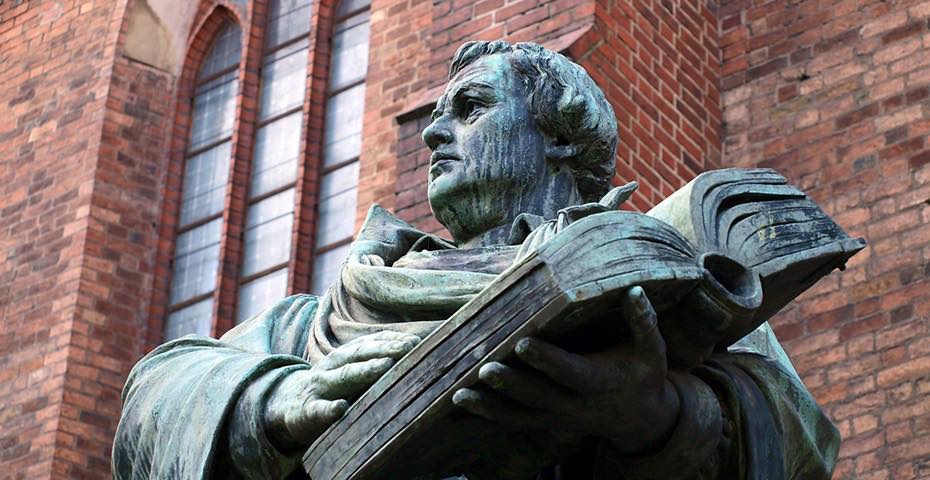
The Reformation and Justification by Faith
Martin Luther nailed his 95 Theses to the door of the Castle Church in Wittenberg, Germany, around 1517. Luther, a theology professor and monk, vehemently protested against the unscriptural elements of the Roman Catholic Church and argued for the need for church reform.
From this act of protest, the term "Protestant" emerged, and the Protestant Reformation began. The five fundamental principles summarizing the Reformation, derived from Luther's 95 Theses, were known as the "Five Solas of the Reformation": Scripture alone (Sola Scriptura), grace alone (Sola Gratia), faith alone (Sola Fide), Christ alone (Solus Christus), and the glory of God alone (Soli Deo Gloria). The Roman Catholic Church was at odds with these "Five Solas."
Luther could not accept the Roman Catholic's teaching that salvation could be achieved through human efforts to obey the law and even through the merits of saints like Mary.
Luther realized that human efforts alone could never fully keep the law. In his pursuit of salvation, he practiced various penances and ascetic disciplines as a monk, just as the ancient Stoics advocated self-control. However, these practices did not provide a resolution to his sin problem.
Luther began reading the Bible and realized that salvation comes through faith in the atonement of Jesus Christ on the cross. He understood that it is only through faith in Christ that one can be freed from the bondage of sin and declared righteous by God.
This theological concept is known as "Justification by Faith," Luther emphasized as the heart of Christianity and a decisive doctrine that either upholds or undermines the faith.
The Gospel of Justification by Faith can be traced back to the Old Testament with examples like Abraham (Genesis 15:6) and the prophet Habakkuk (Habakkuk 2:4).
In the New Testament, Apostle Paul explicitly emphasized this truth in Romans: For in the gospel a righteousness from God is revealed, a righteousness that is by faith from first to last, just as it written: "The righteous will live by faith"(Romans 1:17). He also stressed this in Galatians: "Clearly no one is justified before God by the law, because, 'The righteous will live by faith.'" (Galatians 3:11). Ephesians reaffirms this message: "For it is by grace you have been saved, through faith--and this not from yourselves, it is the gift of God" (Ephesians 2:8).
Just as the above passages affirm, God forgives and declares righteous anyone who believes in the atoning grace of Jesus Christ, regardless of their efforts. The doctrine of Justification by Faith became a central message of the Reformation. Confessional documents such as the Heidelberg Catechism in 1563 and the Westminster Confession of Faith in 1647 firmly established it in Reformed theology.
However, recently, a new perspective on Paul, primarily advocated by theologians like Tom Wright (an Anglican priest), challenged the Reformation's doctrine of Justification by Faith. Some Korean scholars and pastors, such as Kim Seyoon of Fuller Theological Seminary, Kwon Yeonkyung of Soongsil University, and Choi Gapjong of Baeksuk University have also embraced this perspective.
This new perspective emphasizes ethics and sanctification as necessary for completing justification by faith. It argues that even though we receive salvation through faith in the atoning grace of Jesus Christ, it is initially incomplete and must achieved through human works. If a person does not achieve sanctification, they will ultimately lose their salvation.
This perspective contradicts the "Perseverance of the Saints" doctrine in Calvinism and undermines the eternality and sufficiency of Christ's atonement.
The new perspective's focus on sanctification and the necessity of human effort for justification departs from traditional Reformation theology. The Reformation's doctrine of justification teaches that the righteousness granted to believers through faith in Christ is perfect, forensic, and final. It cannot change based on a person's sanctification progress because even at its highest level, human sanctification remains imperfect and tainted by sin. It cannot save a person on its own. John Calvin emphasized, "Sanctification is the fruit of justification but never the ground for it."
The new perspective on justification by faith is a form of Semi-Pelagianism and Arminianism, which believe in human cooperation with God's grace, as well as a closer alignment with Roman Catholic and "Works Righteousness" theology. These views go against the Reformed doctrine of justification and have created significant debates in Western and, more recently, Korean theologians.
In summary, Reformed theology emphasizes that we receive perfect and eternal righteousness as a gift through faith in the substitutionary atonement of Jesus Christ. Those who adhere to Reformed theology are grateful for the grace of justification and live a transformed life with the help of the Holy Spirit, following the teachings of the Bible. The doctrine of Justification by Faith holds great significance for us as we celebrate the 506th anniversary of the Reformation.
Rev. Hwang, Hyunjo, Professor of International Reformed University, and Pastor of Connecticut Vision Church.

 Methodists' Excommunication of Homosexuality
Methodists' Excommunication of Homosexuality
 Summit Trails Theory by Kim Kyung-Jae
Summit Trails Theory by Kim Kyung-Jae

















